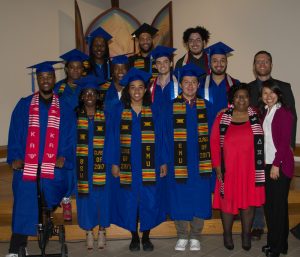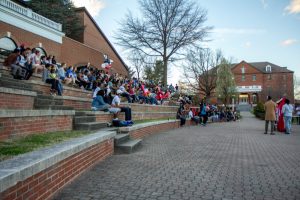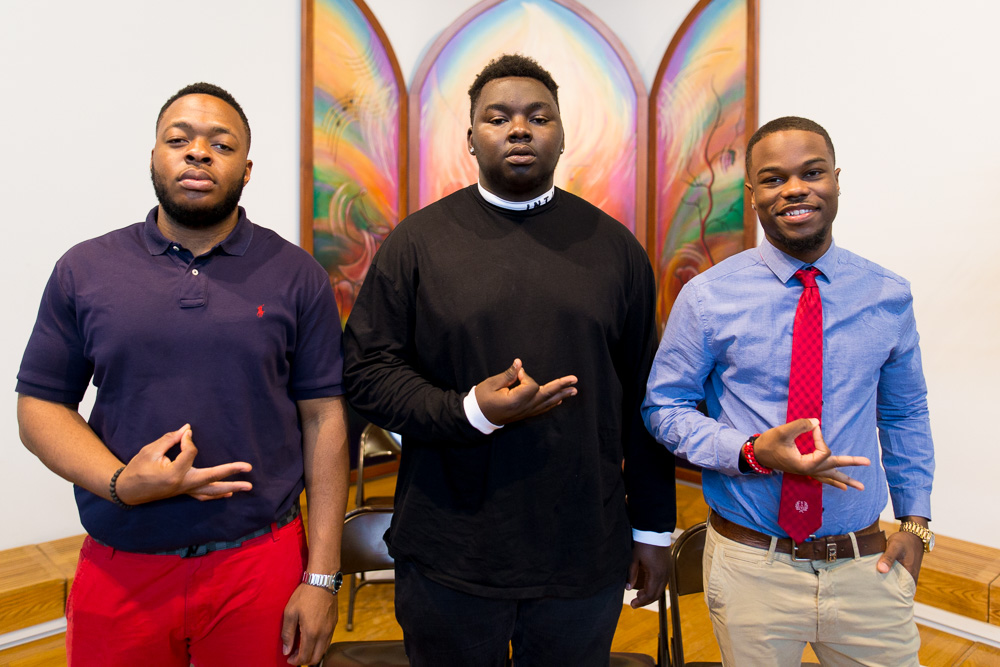Holding a short crimson and cream cane, Azariah Cox was still profoundly moved by what had happened the day before at Eastern Mennonite University (EMU).
Cox couldn’t quite wrap his head around how EMU history was made: he, fellow senior Kennedy Okereke and junior Clinton Ugboaja had successfully become members of Kappa Alpha Psi, the third oldest of the “Divine Nine” black fraternities and sororities in the United States.
The cane is just one outward symbol of membership; Kappa gentlemen began carrying them in the early 1950s as a sign of mannerly sophistication. It’s the inward change that Cox marvels at.
“This doesn’t change you, but it brings out what is already in you,” said Cox, whose cousin and uncle both belong to the fraternity. “The motto of Kappa Alpha Psi Fraternity, Incorporated, is ‘achievement in all fields of human endeavor.’ It’s important that we continue to live up to that motto. In everything we do, we want to make sure EMU has a good name.”
Kappa Alpha Psi has more than 150,000 members in chapters located across the United States and in nine other countries. The fraternity is open to men of all races or ethnicities.
The three students began exploring the idea of this fraternity on campus more than a year ago. With the guidance of Multicultural Student Services co-director Celeste Thomas, they navigated administrative channels and protocols at EMU, with the national fraternal organization and with their sponsoring chapter at Virginia University Lynchburg.
Cox, a photography major who earned Cords of Distinction honors, sees a spiritual dimension among the challenges. “I felt like God wanted us to do this here at the university we belong to and we’re going to graduate from,” he said. “We are a Christian university like no other, so let’s be that, and now we are that. We are the first Kappas at any Mennonite college. That is a big deal.”
Why a fraternity at EMU?
The addition of a fraternity at EMU may seem contrary to EMU’s values, given the reputation that fraternities often have as social party scene organizations. They also single out one group for special status, which may seem incongruent with EMU’s emphasis on community.
Thomas, who joined the sorority Delta Sigma Theta as a student at Shippensburg University of Pennsylvania, speaks from experience about how such organizations differ from campus clubs such as Black Student Union and Latino Student Alliance.

“The kind of network that many Mennonite students or local students have with alumni and the community is not an advantage many of our students of color have,” Thomas said. “We’re building connections with alumni of color here at EMU, but that continues to be a work in progress. Membership in this organization provides instant positive connections and a network for our students. It’s an equitable alternative.”
Thomas also emphasizes the roles and responsibilities that the new Kappa members have committed to. “Joining this organization comes with high expectations for behavior, service and academic achievement,” she said. “The national organization does not allow you to join unless they see a long-term commitment. The expectation is that these new members will grow and build and serve together here at EMU, not just now but in the coming years.”
Cox agrees. He graduated April 30 with a degree in photography and a minor in digital media communication. After a summer internship with the Anacostia Community Museum (with the Washington Community Scholars’ Center) in Washington D.C., he will return to Harrisonburg through next year to help provide a strong foundation for the fraternity’s growth. “I’m excited about building on what we’ve started here. There is more to come.”
Kappa members and several other EMU male students of color are starting a summer mentorship program for male students of color at Skyline Middle School, with the support of Deanna Reed, mayor of Harrisonburg and executive director of the nonprofit youth-oriented On The Road Collaborative. Like Thomas, Reed is also a member of Delta Sigma Theta Sorority.
The probate show

A diverse crowd of more than 100 students, faculty, staff and guests gathered at Thomas Plaza for the first-ever fraternity probate show. For many, the ritual was a new experience.
“It was refreshing,” said first-year Ariel Barbosa,” to see such a key part of black college campus culture expressed so openly on our campus. Also such a wide variety of persons from a variety of ethnicities came to watch, feel and try to understand.”
The new members wore costumes and performed with masks. Cadences, movements and words were choreographed and practiced during their membership intake process, with help from Kappa’s dean and assistant dean of pledges, according to Cox. “The words were muffled on purpose because it was a private, personal experience,” he explained. But the content committed to memory lists prayer, founding members, organization goals and purpose.
“This certainly did look different than other things we often see on campus,” admits Cox. “I was really happy with the group that came to watch and learn, and all the questions people have asked me.”
This is literally a “new chapter” for EMU, says Jim Smucker, vice president for student life. “Our student body is diverse and we are exploring all kinds of programming that will be meaningful to people of all backgrounds and fit with our values. This addition to campus life fits that bill well. I am grateful to Celeste Thomas for helping to make it happen, our first courageous students, and EMU for taking this new bold step.”
